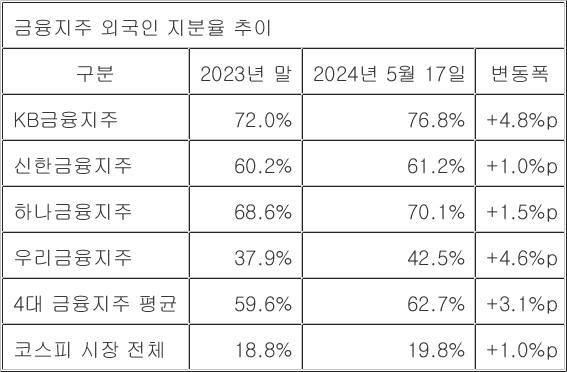When KOSPI goes up by 1%, financial holding companies rise by 3%… KB nears 80% mark
Foreign investors show interest in shareholder returns… More focus on corporate value-up,
,
,
![[Yonhap News file photo]](https://imgnews.pstatic.net/image/001/2024/05/20/PYH2024010911430001300_P4_20240520061606479.jpg?type=w647)
[Yonhap News file photo],
,
, ‘ (Seoul=Yonhap News) By Han Ji-hoon and Lee Dong-hwan = Recently, the foreign ownership ratio of the top four financial holding companies reached its highest level on record.’,
,
, ” The increase in foreign buying of undervalued financial holding companies is analyzed to be the result of strengthened shareholder rewards policies by each company since early last year, combined with the corporate value-up program announced by the government in February.”,
,
, ‘ According to the Korea Exchange on the 20th, the foreign ownership ratio of the top four financial holding companies (KB, Shinhan, Hana, Woori) after the market close on the 17th averaged 62.7%.’,
,
, ‘ This is the highest figure in 5 years and 3 months since Woori Finance, which entered the market the latest among the top four financial holding companies, had an average of 58.2% at the time of listing in 2019.’,
,
, ‘ The average ratio at the end of last year was 59.6%, and it has increased by 3.1 percentage points (%) just within this year.’,
,
, ‘ Although the overall foreign ownership ratio in the entire KOSPI market increased from 18.8% at the end of last year to 19.8% on the 17th, the increase is smaller when compared to financial holding companies.’,
,
, ‘ Looking at individual companies, KB Financial Group’s foreign ownership ratio increased from 72.0% at the end of last year to 76.8% on the 17th, approaching the 80% mark.’,
,
, ‘ During the same period, Shinhan Financial went from 60.2% to 61.2%, Hana Financial from 68.6% to 70.1%, and Woori Financial from 37.9% to 42.5%, all showing an increase in foreign ownership ratio.’,
,
, ‘ In particular, KB Financial recorded its highest foreign ownership ratio since its listing on October 10, 2008, reaching 77.0% on the 13th. As for Woori Financial, the foreign ownership ratio as of the 17th is at its highest level since listing.’,
,
, ‘ It is self-analyzed that the active shareholder return policies implemented by financial holding companies have brought in foreign investors\’ buying interest.’,
,
, ‘ It is viewed that foreign institutional investors, who have a strong tendency for long-term investment and aim for relatively high dividend yields, have steadily entered as shareholders.’,
,
,

,
,
, ‘ A KB Financial official stated, “After announcing an active and differentiated shareholder return policy in the first quarter of this year following last year, the market response was positive.”‘,
,
, ‘ The official emphasized, “The fact that our profit generation capability and capital management capability are superior to other companies is a point that can increase the possibility of shareholder returns.”‘,
,
, ‘ In the case of Shinhan Financial, although about 10% of foreign ownership was sold off earlier this year, the overall foreign ownership ratio is being maintained. The official said, “We see that the sell-off volume has been absorbed smoothly.”‘,
,
, ‘ This year, despite foreign capital from entities such as Apnerty, BNP Paribas, and EQT (formerly Bearing) selling off a large amount of Shinhan’s shares, it is explained that the continuous shareholder return policy has actually increased the foreign ownership ratio.’,
,
, ‘ A Hana Financial official said, “Since early last year, we have been striving to increase shareholder returns and overcome undervaluation in stock prices.” The official also stated, “In January of this year, we announced a plan to purchase and burn back our own shares of 300 billion won.”‘,
,
, ‘ Additionally, it was mentioned, “In addition to this, with the government\’s corporate value-up program, the interest of foreign investors who have experienced the success of the Japanese stock market has also increased.”‘,
,
, ‘ A Woori Financial official also said, “It seems that various shareholder return policies implemented since last year are having an impact on raising corporate value.”‘,
,
, ‘ Added that, “The high expectations for structural improvement in Woori Finance’s profit structure due to the securities business expansion through the merger of Woori Investment & Securities and POSCO Securities seem to have had an effect.”‘,
,
, ‘ [email protected]’,
,
,

